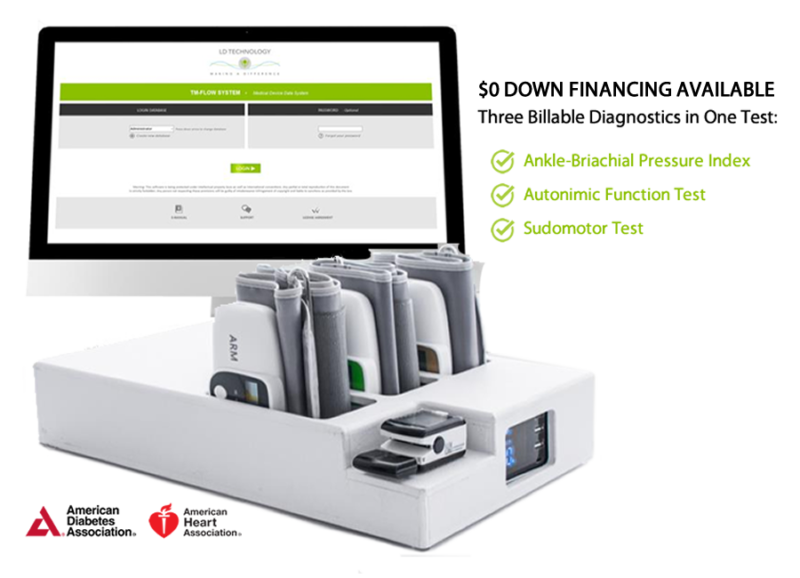Frequently Asked Questions
The TM Flow device offers numerous benefits for medical practices, including non-invasive and accurate testing, early detection of autonomic and arterial dysfunctions, and comprehensive diagnostics that reduce the overall cost of patient care. Additionally, the device’s tests are easy to bill with multi-code diagnostics, making it a valuable investment for enhancing patient care and optimizing practice efficiency. It also supports compliance with standards of care recommended by leading health organizations.
Yes, the TM Flow device is covered by Medicare and most private pay carriers. Specific CPT codes, such as 95921 for cardiovagal innervation and 93923 for ankle-brachial pressure index, ensure that the diagnostics are easy to bill. Coverage and reimbursements may vary depending on the Medicare locality, but the comprehensive diagnostics offered by the TM Flow device are widely recognized and supported by insurance providers.
Autonomic nervous system testing is crucial for diabetes and cardiovascular patients because it helps in the early detection of autonomic neuropathy, which is a common complication in these conditions. Early detection through ANS testing allows for timely intervention and management, reducing the risk of further complications. The American Diabetes Association recommends ANS testing as a standard of care for patients with Type 1 and Type 2 diabetes, highlighting its importance in effective diabetes management.
The TM Flow device is an advanced, non-invasive diagnostic tool designed to perform a series of tests that aid in the identification and early detection of autonomic nervous system (ANS) and arterial dysfunctions. It provides quantitative assessments of the ANS, helping to distinguish between early and late stages of autonomic neuropathy. The TM Flow device is particularly valuable for cardiovascular and diabetic autonomic neuropathy (DAN) testing, making it an essential tool in diabetes management and cardiovascular assessments.
The main causes of autonomic neuropathy are as follows:
*metabolic factor such as high blood glucose, long duration of diabetes, abnormal blood fat levels and possibly low levels of insulin
*neurovascular factors leading to damage to the blood vessels that carry oxygen and nutrients to nerves
*autoimmune factors that cause inflammation in nerves
*mechanical injury to nerves such as carpal tunnel syndrome or inherited traits that increase susceptibility to nerve disease
*lifestyle factors such as smoking or alcohol use
*vitamin deficiencies particularly B vitamins
*Biemer’s anemia
*infections such as lymes disease, shingles Epstein-Barr, hepatitisC and HIV/aids
*kidney liver or thyroid disorders
exposure to toxins
*repetitive physical stress possibly from occupational activities
There are many symptoms of Autonomic Neuropathy. These are:
*Cardiovascular symptoms including resting tachycardia, exercise intolerance orthostatic hypotension and silent myocardial ischemia
*Gastrointestinal symptoms include esophageal dysmotility, gastroparesis diabeticorum, constipation, diarrhea and fecal incontinence
*pupillary symptoms include Pupillomotor function impairment
*Genitourinary symptoms include neurogenic bladder, erectile dysfunction retrograde ejaculation and female sexual dysfunction
*metabolic symptoms include hypoglycemia unawareness and hypoglycemia associated autonomic failure
*Sudomotor symptoms include anhidrosis, heat intolerance, gustatory sweating and dry skin
RSS FEED
- The TM Flow is a highly reimbursable diagnostic in Portland, OR
- Pain Clinics in Albuquerque, NM Adopt the TM Flow as Gold Standard
- Neuropathy in Philadelphia, PA can be detected with the TM Flow device
- Pain Management Clinics in Dallas, TX are Using the TM Flow to Diagnose Symptoms
- Unlocking the Potential of ANS Testing: Insights for Healthcare Providers
- Neuropathy clinics in Savanah, GA use the TM Flow
- Come to Charleston, WV to Get a TM Flow
- How the TM Flow will maximize your physician practice in Boise Idaho
- Doctors in Pittsburg, PA are using the TM Flow for the treatment of neuropathy
- Which Patients Require ANS Testing?
